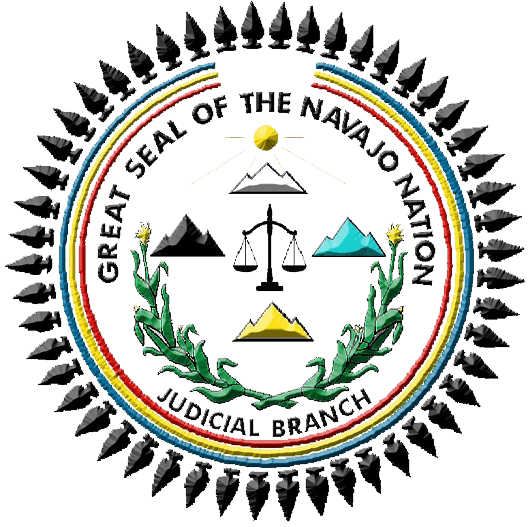Applicable Administrative Policies

Applicable Administrative Policies
The following rules, policies and procedures apply to all personnel in Navajo Nation Probation and Parole Services. They are set forth in alphabetical order:
- Fleet Management Tribal Vehicle Operator’s Handbook
- Judicial Branch Administrative Leave Policy, effective Feb 14, 2008;
- Judicial Branch Case Management Policy, effective August 18, 1999;
- Judicial Branch Consolidation Policy, effective September 10, 1997 (waived in the Pilot Project);
- Judicial Branch Court Automation Policy, effective October 10, 1996;
- Judicial Branch Employee Code of Conduct, effective April 29, 1991;
- Judicial Branch Grievance Board, Rules of Procedure, revised January 6, 1997;
- Judicial Branch Personnel Rules, revised June 20, 1997;
- Judicial Branch Training Policy, effective March 20, 1997;
- Navajo Nation Privacy Act, 2 N.N.C. §§81-92;
- Navajo Nation Travel Policy;
- Probation and Parole Services Standard Operating Procedures, as updated and revised;
- Other policies of general application to Navajo Nation employees.
Field Activity Policy
Field Activity Policy
PPOs may spend much of their time meeting with adult clients, juvenile clients, parents, school authorities, social services and behavioral health staff; attending chapter or other meetings at night or on weekends. Because neighborhoods on the Navajo Nation are largely rural and far-between, frequent travel and field work is expected.
- PPOs shall log out for field activity. The log shall contain a description and location of the field activity, and beginning and expected end time for the field activity (excluding travel).
- PPOs shall log in when field activity is completed and indicate in the log the persons contacted.
- The log shall be maintained by the Office Technician.
- Field activity travel shall be pursuant to the Navajo Nation Travel Policy.
Work Hours Policy
Work Hours Policy
- Regular office/work hours apply with some flexibility as set forth below.
- The PPO is permitted to be absent from the district office for properly logged field work.
- If not otherwise scheduled to appear in court or meet with clients, the PPO may report for work an hour later than normal if he/she was not able to complete field work before 7:00 p.m. the previous evening. The PPO must (a) call in and leave a message for the Office Technician the night before; and (b) otherwise, be reachable during that hour via phone.
- The PPO shall update the field work log immediately upon reporting to work.
Staff Meeting Policy
Staff Meeting Policy
PPS staff meetings may be called by the Chief Justice and Chief Probation Officer. District-level meetings may be called by the Court Administrator. In the Pilot Project, district level meetings may also be called by the Senior District Probation Officer.
Regular meetings are as follows:
- Quarterly Meetings – called by the Chief Probation Officer and held in the first week of every third month with one week’s advance notice by written memorandum. These meetings shall include an overview of the previous quarter, verbal district status reports, discussion of policy/program changes and directives and any other item that facilitates operations. Once a year, a quarterly meeting shall address review of the Standard Operating Procedures and generally, review of PPS operations. Minutes shall be kept. Abstract minutes may be distributed. Meeting is mandatory.
- Monthly District-Level Meetings – scheduled by the Office Technician and attended by district PPS staff to monitor and evaluate district level PPS activities and address immediate needs. Judges, CA, the Peacemaker Liaison, and the Chief Probation Officer may be invited to attend.
- Pilot Project Planning and Coordination Meetings – may be scheduled weekly, biweekly, or otherwise according to the Pilot Project’s current revised plan.
Staff Development
Staff Development
In coordination with PPS field offices, the Chief Probation Officer shall provide the leadership to identify staff development needs, identify and secure staff development opportunities, and promote and support the continuous professional growth of PPS personnel.
Operations Development
Operations Development
By the delegated authority of the Chief Justice, the Chief Probation Officer shall develop and implement the Standard Operating Procedures. All PPS personnel are encouraged to participate actively in its development and review. There shall be annual review of operations, generally.
Annual Report
Annual Report
The Chief Probation Officer shall submit an annual report to the Chief Justice on PPS operations. The annual report shall contain data on sentencing options being recommended by Navajo Nation Probation and Parole Services in all districts.
Treatment of Elders Under Supervision
Treatment of Elders Under Supervision
An elder is any person 55 years of age and over. Elder Navajos are required by law to be distinctly treated with respect. The treatment of elders under PPS supervision shall be no different.
9 N.N.C. § 1802 provides:
It is the policy of the Navajo Nation to continue the traditional respect which members of the Navajo Nation have for Diné elders. Elders are valuable resources to the Nation because they are repositories and custodians of Navajo history, culture, language, and tradition; vested in Diné elders is the hope of the Navajo Nation to retain its tribal history, culture, language and tradition.
Pepper Spray Policy
Pepper Spray Policy
Subject to defensive training and certification of proper use as arranged with the Navajo Nation Police Academy by the Chief Probation Officer, PPOs may carry pepper spray (oleoresin capsicum). The pepper spray can be used only while on-duty and only for self-defense, following which the PPO is required to file a police report. Non-violent alternatives, including withdrawal from the aggressor, shall be considered before use. The pepper spray canister is to be concealed and not drawn or displayed unless there is a reasonable belief of a threat of immediate injury. When not carried, the canister must be securely stored away from children and unauthorized persons.
Look to the wellbeing of any person on which you have used this spray as follows:
- After you have ensured you are safe, contact medical personnel.
- Make sure the person has fresh air. If the person displays any breathing problems or has a history of breathing/heart problems, notify medical personnel immediately.
- Instruct the person to remove contact lenses, if any.
- Reassure the person the pepper spray effects are temporary.
- Flush the person’s face with cool water or apply a wet towel to hasten recovery.
- Advise the person he/she may be charged with assault.
- Immediately contact the Chief Probation Officer and submit a written report within 24 hours.
- If the person is also a PPS client, file it as an incident in the clients’ progress report.
TUBA CITY JUDICIAL DISTRICT -- PROBATION/PAROLE SERVICES AND PEACEMAKING SERVICES TRIBAL VEHICLE USE PROCEDURES
Navajo Nation Vehicle. One vehicle shall be available on a priority basis for Probation and Parole Services and Peacemaker Liaison official use. If an additional vehicle is necessary, arrangements are to be made with the Court Administrator for temporary use.
Senior Probation/Parole Officer and Peacemaker Liaison Responsibilities.
a.
Shall require authorized drivers and staff to read and agree to comply with the provisions of the Navajo Nation Motor Vehicle Operator's Handbook.
b.
Shall be responsible to plan, coordinate, and agree to a weekly or biweekly schedule for use of the vehicle to serve the mutual benefit of both programs.
c.
Together they shall designate an Office Technician to be responsible to coordinate official use of the tribal vehicle.
Designated Office Technician Responsibilities.
a.
Shall keep the vehicle properly maintained and serviced as required.
b.
Shall keep the vehicle keys and coordinate official use of the vehicle based on the approved weekly or bi-weekly schedule.
c.
Shall require each authorized driver of the vehicle to show a current valid operator's permit and driver's license before the vehicle keys, gasoline cards, and mileage log are given to the authorized driver.
d.
Shall submit a vehicle mileage log to AOC on or before the 20th day of each month.
e.
Shall report any non-compliance of the Operator's Handbook to the Senior Probation Officer or Peacemaker Liaison.
f.
Shall provide the Court Administrator with a copy of the current valid operator permit and driver's license of each authorized driver for submittal to the Fiscal Office in the Administrative Office of the Courts.
Authorized Driver Responsibilities.
a.
Shall comply with all official use policies of the Navajo Nation Motor Vehicle Operator's Handbook.
b.
Shall use the vehicle mileage log to record his/her name, date and time of pick-up and return, and exact beginning and ending odometer readings each time the vehicle is driven.
c.
Shall remove all trash and personal items from the vehicle after each use.
d.
Shall return the vehicle to the designated parking place and return the vehicle keys, gasoline cards, and mileage log to the designated Office Technician each time the vehicle is driven.
e.
Shall provide a written report identifying damages, problems or concerns with the operation or condition of the vehicle to the designated Office Technician and shall provide copies of the written report to the Senior Probation Officer and Peacemaker Liaison.
Navajo Nation Vehicle Misuse/Abuse Complaints.
a.
The Chief Probation Officer shall investigate complaints against the Senior Probation Officer. Complaints may come from the Motor Vehicle Review Board, Fleet Management, staff or public. Judicial Branch Personnel Rules shall apply if disciplinary action is necessary. Non-conflicting provisions of the SOP may also be applicable.
b.
The Peacemaking Program Coordinator shall investigate complaints against the Peacemaker Liaison. Complaints may come from the Motor Vehicle Review Board, Fleet Management, staff or public. Judicial Branch Personnel Rules shall apply if disciplinary action is necessary.
c.
The Senior Probation/Parole Officer shall investigate complaints against supervised personnel. Complaints may come from the Motor Vehicle Review Board, Fleet Management, staff or public. Judicial Branch Personnel Rules shall apply if disciplinary action is necessary. Non-conflicting provisions of the SOP may also be applicable.
d.
The Peacemaker Liaison shall investigate complaints against supervised personnel. Complaints may come from the Motor Vehicle Review Board, Fleet Management, staff or public. Judicial Branch Personnel Rules shall apply if disciplinary action is necessary.
Use of Navajo Nation Vehicle. This vehicle may be used by other judicial district staff when not in use by Probation/Parole Services and/or the Peacemaker Liaison if arrangements are made between the Court Administrator and designated Office Technician.
Emergency or Vehicle Breakdown During Work Hours.
a.
Authorized drivers are to call the nearest Fleet Management Office. Phone numbers for Fleet Management offices may be found in the Operator's Handbook provided in every vehicle by the designated Office Technician. Fleet Management will either send a tow vehicle or provide you with instructions on what to do. Please follow the instructions. Failure to follow instructions or to get clearance from Fleet Management for personal expenses related to vehicle breakdowns may result in out-of-pocket breakdown-related expenses not being reimbursed.
b.
Authorized drivers may also call Ben Manuelito, Fleet Management at 928-871-6662.
Emergency or Vehicle Breakdown During Off-Work Hours. Authorized drivers are to contact the local police district in the event of an emergency or vehicle breakdown during off-work hours and ask for contact information for Fleet management employees on call. The local police district maintains an up-to-date list.
Emergency or Vehicle Breakdown During Off-Work Hours and Off-Reservation.
a.
In the Albuquerque area, call the Crownpoint police district at (505) 786-2050/2051 for a list of on-call Fleet Management employees.
b.
In the Flagstaff-Phoenix area, call the Tuba City police district at (928) 283-3111.
c.
In the Durango-Farmington area, call the Shiprock police district at (505) 368-1350/1351.
Acknowledgement.
Alice Huskie, Court Administrator, 5/26/09
Delores Wilson-Aguirre, PPS District Supervisor / Senior Probation Officer, 5/26/09
Emmett McCabe, Peacemaker Liaison, 5/26/09
